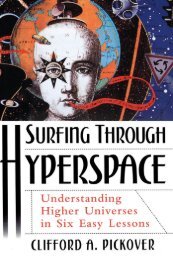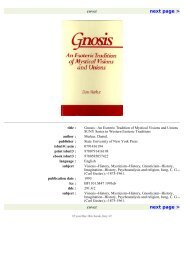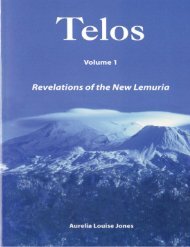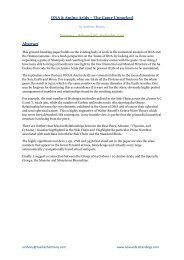clifford_a-_pickover_surfing_through_hyperspacebookfi-org
clifford_a-_pickover_surfing_through_hyperspacebookfi-org
clifford_a-_pickover_surfing_through_hyperspacebookfi-org
Create successful ePaper yourself
Turn your PDF publications into a flip-book with our unique Google optimized e-Paper software.
166 <strong>surfing</strong> <strong>through</strong> hyperspace<br />
Where will humans be, five billion years from now, at the end of the world?<br />
Even if we could somehow withstand the incredible heat of the sun, we would<br />
not survive. In about seven billion years, the Sun's outer "atmosphere" will<br />
engulf the Earth. Due to atmospheric friction, the Earth will spiral into the sun<br />
and incinerate. In one trillion years, stars will cease to form and all large stars<br />
will have become neutron stars or black holes. In 100 trillion years, even the<br />
longest-lived stars will have used up all their fuel.<br />
If this ending seems too dismal, perhaps we should ask if there is hope for<br />
humanity when the Sun expands to engulf the Earth in seven billion years. To<br />
give an answer, first consider that around four billion years ago, living creatures<br />
were nothing more than biochemical machines capable of self-reproduction. In<br />
a mere fraction of this time, humans evolved from creatures like Australopithecines.<br />
Today humans have wandered the Moon and have studied ideas<br />
ranging from general relativity to quantum cosmology. Once space travel<br />
begins in earnest, our descendents will leave the confinement of Earth. Because<br />
the ultimate fate of the universe involves great cold or great heat, it is likely<br />
that Homo sapiens will become extinct. However, our civilization and our values<br />
may not be doomed. Who knows into what beings we will evolve? Who<br />
knows what intelligent machines we will create that will be our ultimate heirs?<br />
These creatures might survive virtually forever. They may be able to easily contemplate<br />
higher dimensions, and our ideas, hopes, and dreams carried with<br />
them. There is a strangeness to the loom of our universe that may encompass<br />
time travel, higher dimensions, quantum superspace, and parallel universes—<br />
worlds that resemble our own and perhaps even occupy the same space as our<br />
own in some ghostly manner.<br />
Some physicists have suggested that the fourth dimension may provide the<br />
only refuge for intelligent life. Michio Kaku, author of Hyperspace, suggests<br />
that "in the last seconds of death of our universe, intelligent life may escape the<br />
collapse by fleeing into hyperspace." Our heirs, whatever or whoever they may<br />
be, will explore these new possibilities. They will explore space and time. They<br />
will seek their salvation in the higher universes.<br />
The upbeat feelings of theoretical physicist Freeman J. Dyson best express<br />
my beliefs:<br />
Godel proved that the world of pure mathematics is inexhaustible; no<br />
finite set of axioms and rules of inference can ever encompass the<br />
whole of mathematics; given any finite set of axioms, we can find<br />
meaningful mathematical questions which the axioms leave unan-







